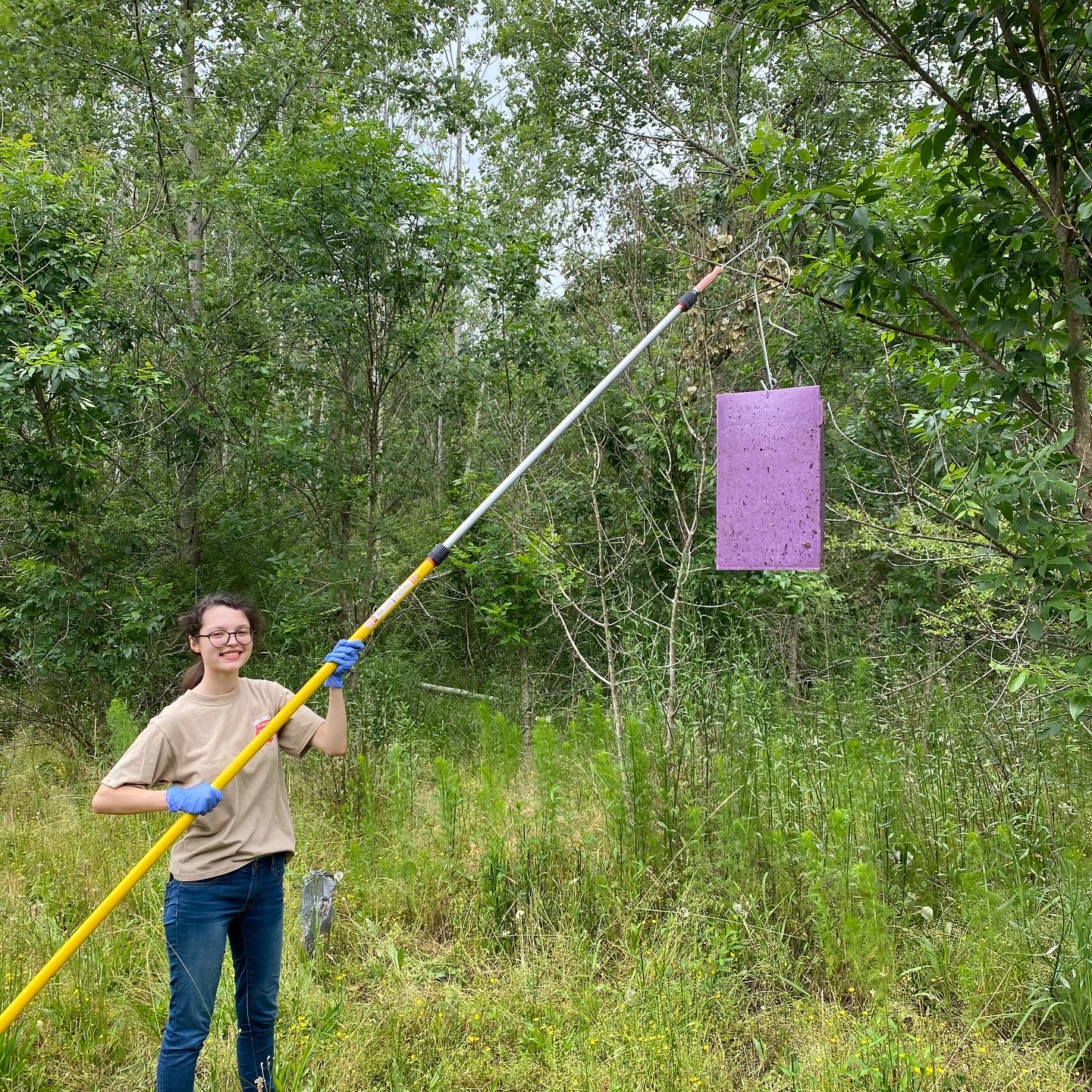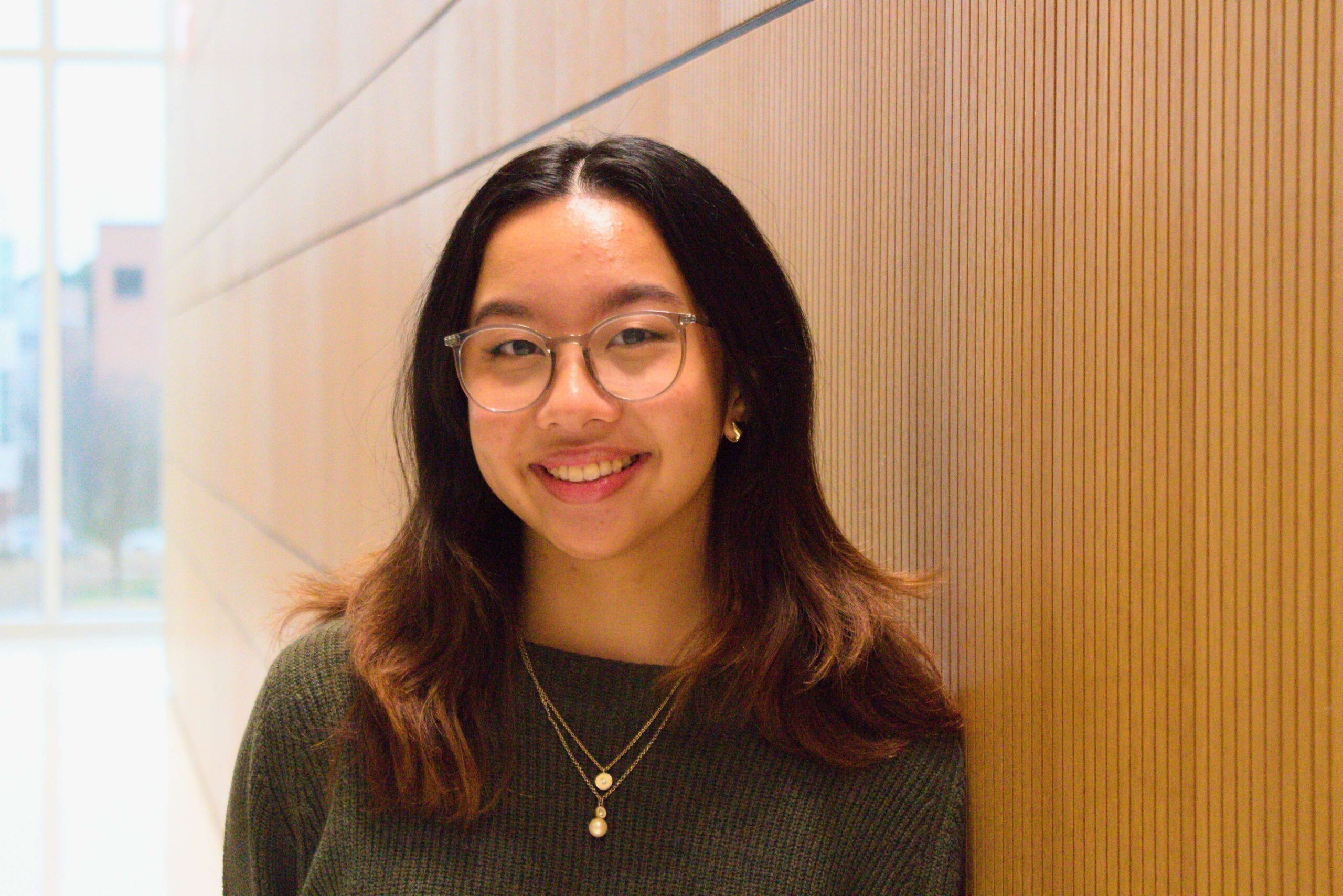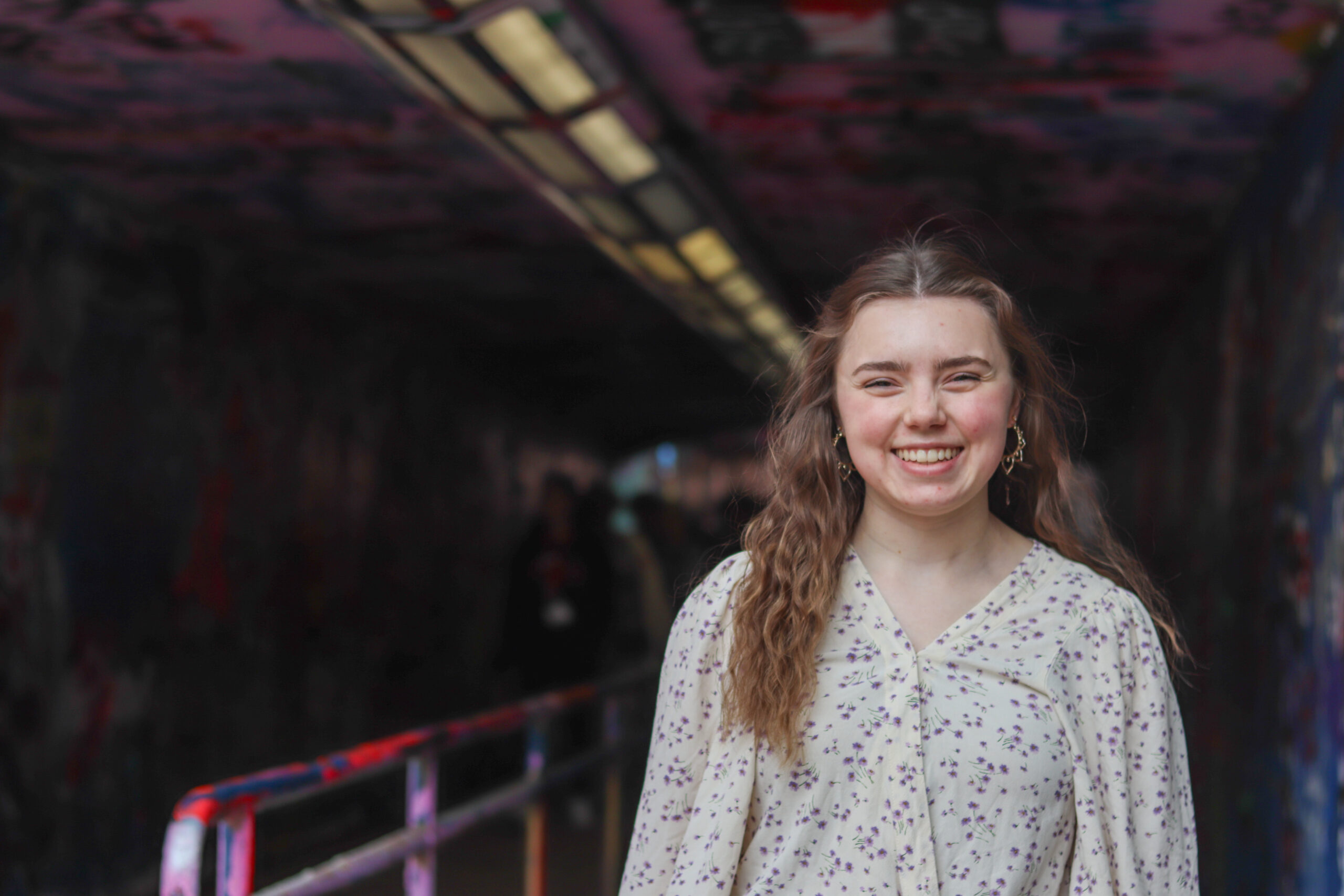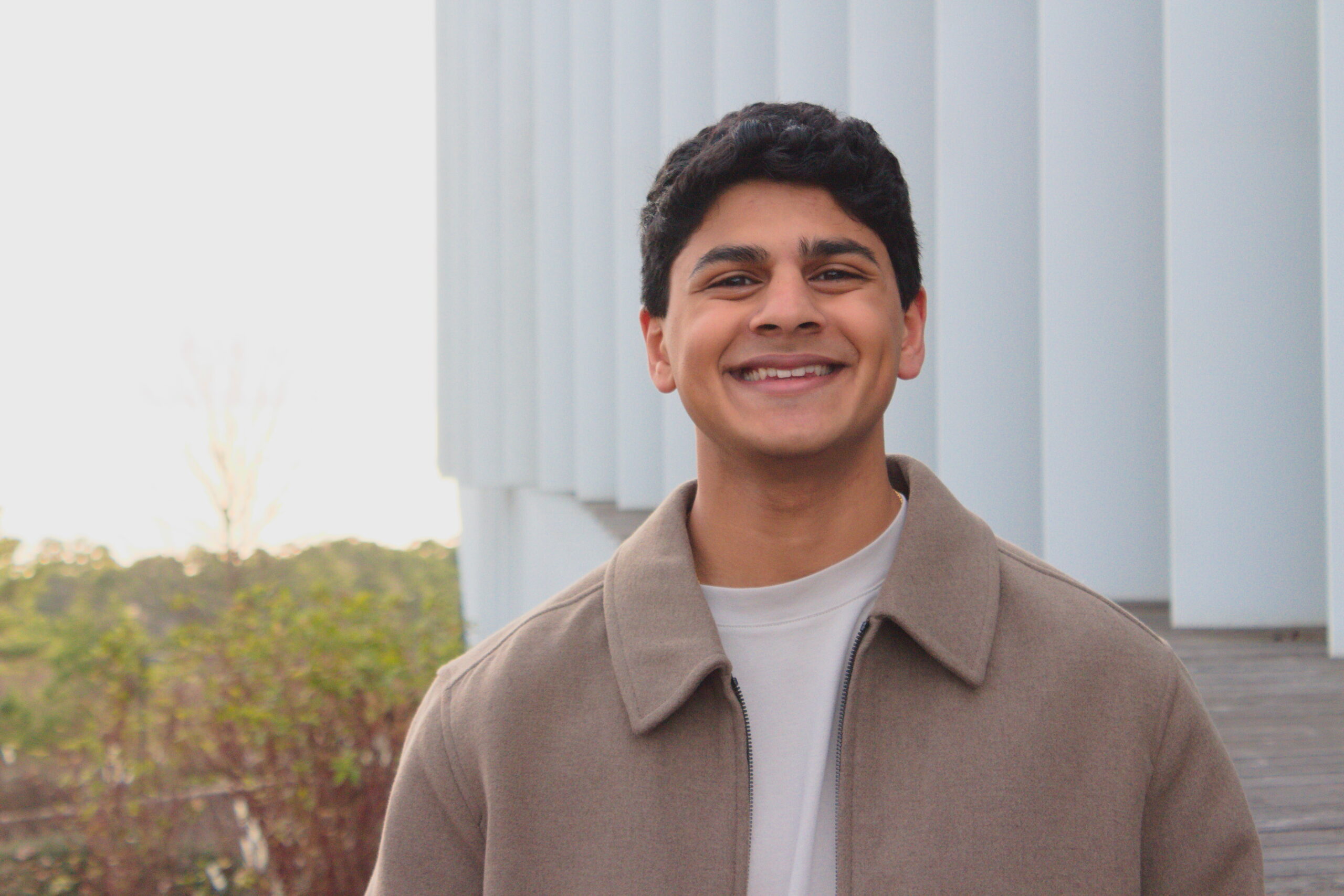Fisheries, Wildlife, Conservation Biology, and Courtney Smith

Goodnight Scholar Courtney Smith 22′ is currently conducting research in the Forest Health Lab. Continue reading to learn more about who she is, how she was introduced to research, and the work that she is doing over the summer.
Tell us about yourself. Where are you joining the Goodnight Scholars Program from? What are some things you like to do both related to school and for fun?
I am Courtney Smith, a rising senior from Forest City, North Carolina. My small town is situated in between Charlotte and Asheville, so I always had a great view of the mountains. As a kid, I learned to love the natural world through my hobbies. I love all things outdoors — hiking, kayaking, swimming, taking my dog on walks through the woods, etc. I’m also a reader and a gamer. On campus, I’m involved in the Climate Reality Project as a member of the executive committee. I’m also the secretary of the Bee Campus USA Committee, and I’m the co-president of Xi Sigma Pi (a forestry honors society). I’m often in Talley enjoying a coffee and studying, but I also love to walk around Lake Raleigh on Centennial Campus. And of course, I love to study in the Goodnight Scholars lounge!

In your own words, describe the Fisheries, Wildlife, and Conservation Biology major and why you decided to major in it?
The Fisheries, Wildlife, and Conservation Biology major offers amazing hands-on learning experiences and internship opportunities. The love that I have always had for the outdoors and the natural world pushed me to choose this major and concentrate on Conservation Biology. Now more than ever, it is important that we work to protect the environment and our wildlife. The natural world provides us with many services, and it is our responsibility to use it wisely. The program is full of amazing professors who value nature, too. I have always felt that my courses in the major have encouraged me to use critical thinking and to gain technical skills that I will use in my future career. It’s also customizable to suit my interests; since I am particularly interested in forestry and entomology, I have been able to take many entomology courses and forest management courses as a part of my degree program. I love the flexibility and real-world skills that the major provides. The major requires that students get out of the classroom to gain the skills that we need by attending the FWCB summer camp or gaining two internship experiences. For this requirement, I got to intern with the North Carolina Forest Service and the NC Museum of Natural Sciences.
How did you get into research? What makes doing research something that you enjoy?
I got into research after an internship at the NC Museum of Natural Sciences. I worked in the Naturalist Center, which is a room full of research specimens that visitors can come interact with. Through this internship, I spoke to many museum workers and scientists. They answered all of my questions and encouraged me to pursue research. During my sophomore year, I attended the Office of Undergraduate Research’s “Speed Data-ing” event, and I learned more about research opportunities. I reached out to Dr. Elsa Youngsteadt, and I soon began working in the Youngsteadt Urban Ecology Lab. Here, I got to work on many projects, which involved topics like honey bee and bumble bee movement and management of carpenter bees. Since then, I have had many amazing opportunities to grow my research skills. I enjoy research because it pushes me to think critically and solve problems. It’s almost like a puzzle, and it involves a lot of trial and error. For me, it’s really satisfying to “solve” the puzzle and to play a role in growing the knowledge of the scientific community. Plus, my research has allowed me to get into the field and spend time in the outdoors!
Tell us about the current research you are doing now on campus?
Currently, I work as an undergraduate research assistant in the Forest Health Lab with Drs. Kelly Oten and Robert Jetton. I mostly work on projects involving invasive species that threaten our forests. One of the projects I work on most often involves the phenology of the emerald ash borer. The emerald ash borer is an invasive beetle from Asia that kills ash trees by feeding beneath the bark as larvae. I help out with this project by debarking ash trees, collecting specimens, and counting/measuring them to learn more about their life stages. I also check and set traps for the pest. Learning more about its life stages in the Southeast could inform effective management, allowing us to protect our ash trees and our forest ecosystems.
Next, I received an undergraduate research award to start my own research project this summer on the elongate hemlock scale, which is another invasive insect that threatens Fraser fir Christmas trees in North Carolina.This industry is very important to North Carolina’s economy. I’ll be testing a new management method for this pest, and I’m excited to get started!
Lastly, I get to work on extension and outreach, which is really important as we try to combat invasive species. As a part of this position, I’ve been able to attend and help out with forest health workshops and conferences. I’ve also been working on a project called Poolside Pests, which encourages North Carolinans to check their pool filters for the Asian longhorned beetle and the spotted lanternfly, two destructive pests that are getting close to NC and may be attracted to water. I created a website for this project, which you can find at www.poolsidepests.com
What is one thing that you’ve taken away from your research experience that you can keep with you for the rest of your life?
My research experiences have given me the confidence to solve problems as I learn to think like a scientist. As a kid, I honestly shied away from science and math. Even though I loved science, I didn’t think I was smart enough to pursue it as a career. It wasn’t until my senior year of high school that I decided to pursue a major in STEM. My research experiences as an undergraduate have shown me that being a research scientist is attainable. I have learned so much from my research mentors, and all of them have encouraged me and helped me gain the confidence to become a researcher. I will always remember these early research experiences because they truly introduced me to the world of science. I’ve been able to experience the scientific process firsthand, and I know that these experiences have been critical to my decision to enter graduate school and ultimately a research career. This confidence will push me to complete research projects in the future, even when it gets tough!
If readers wanted to follow along with your research, where would they go to stay connected?
The research lab I work in has a Twitter and a Facebook page, which you can find by searching NCSU Forest Health. I also have an Instagram page that is dedicated to forest entomology and the research that I get to work on (@courtsbuglife).
- Categories:


